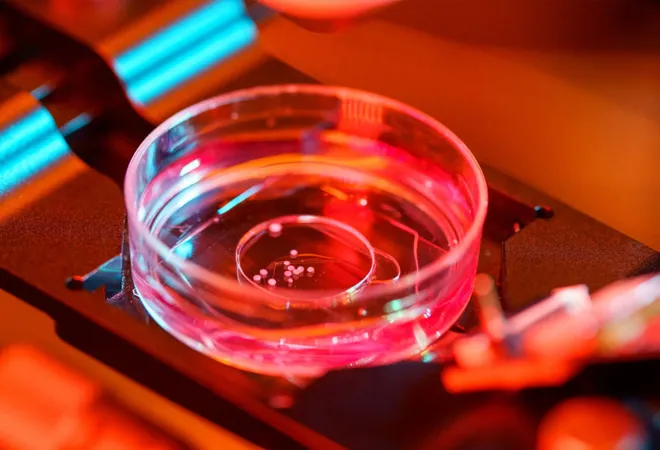
In the last few years, Artificial Intelligence (AI) has rapidly redefined the capabilities of technology, but science is already pushing the boundaries of cognitive computing further. Organoid Intelligence (OI) is an emerging multidisciplinary field that envisions novel biocomputing models
<1> using stem cell-derived brain organoids.
Organoids are small tissue cultures derived from stem cells to replicate part of a human organ’s functioning. They have been used for various purposes such as disease modelling and drug testing, but researchers are now beginning to explore their potential for information processing.
Culturing OI
In late-2022, a Melbourne-based team of researchers led by Cortical Labs created an integrated system of
in vitro neural networks and
in silico computing, called
DishBrain, capable of playing the video game ‘Pong’. The team cultured 800,000 lab-grown brain cells and trained them using a high-density multielectrode array chip. Pulses of voltage indicated in-game variables like the direction and distance of the ball and feedback was given in the form of electrical pulses at random locations when it missed the ball. In the absence of real-time incentive systems like dopamine pathways, scientists nudged the cell’s behaviour using the
free-energy principle. This theory posits that living systems, such as cells, work to minimise unpredictability. The culture made its world more predictable by learning the game. Researchers were able to observe apparent learning within five minutes of gameplay that was not observed in control conditions.
 Source: Kagan et al., Neuron, 2022.
Source: Kagan et al., Neuron, 2022.
Such organoid studies show promise for replicating the cellular aspects of learning and memory to further our understanding of the brain. Researchers have already begun experimentation to determine the effects of substances like medicine and alcohol on brain organoids’ ability to learn. Brain organoids can also be cultured to mimic different regions and cell layers, resembling the early stages of brain development. They can be used to study the cognitive aspects of neurological disorders. Comparing memory formation in organoids derived from people with and without
Alzheimer's disease might reveal ways to repair the deficits. Scientists could also study personalised brain organoids to investigate how genetic factors, medicines, and other environmental elements influence an individual’s condition. Combining this with AI data analysis could finally provide explanations and curative treatments for diseases like
Parkinson’s.
Brain organoids can also be cultured to mimic different regions and cell layers, resembling the early stages of brain development.
However, DishBrain’s ability to self-organise activity in response to feedback suggests intelligence and indicates the potential of using organoids to understand cognition. Earlier this year, researchers from Johns Hopkins University and Cortical Labs came together to outline a plan to explore this
potential. The team hopes to harness brain organoids to create biocomputers that are faster and more efficient than silicon computing and AI.
Advantages of biological learning
There are three main advantages of biological learning. The first is that while human brains may be slower than machines at processing simple information like numeric data, they massively outperform machines when it comes to processing complex information and making decisions on highly heterogeneous and incomplete datasets. In 2013, it took the world’s fourth-ranked supercomputer,
Fujitsu, 40 minutes to simulate 1 second of neural activity, and to date, no technology can run large-scale simulations faster than in
real-time.
The second is that biological learning also requires far fewer samples to learn.
AlphaGo was the first computer programme to beat a human world champion in the complex game of ‘Go’. It outperformed a human but required training data from 1,60,000 games—the equivalent of playing five hours a day for over 175 years to do so.
The first is that while human brains may be slower than machines at processing simple information like numeric data, they massively outperform machines when it comes to processing complex information and making decisions on highly heterogeneous and incomplete datasets.
The third is the energy efficiency of biological learning. Humans operate at 10^6 times better
power efficiency as compared to Frontier, the world’s most powerful supercomputer. The difference is significant, even accounting for the disparity in the tasks performed. This is increasingly relevant, given that the leaps in technology made in recent years have led to an insatiable demand for computing power. This ‘computational burden’ is pushing progress in deep learning towards becoming economically, technically, and environmentally
unsustainable.
The future of OI
These advantages of biological learning make OI a tempting notion to embrace. However, there are significant ethical and technological hurdles to overcome before we develop an OI biocomputer. Most ethical
concerns centre around questions of consciousness and suffering. But the ethical concerns around OI start at the cell donation stage and continue throughout the technology's culturing, learning, and application. A few examples are as follows. At the time of donation, voluntary
informed consent is key to protecting the rights and dignity of the donor. Selection biases must also be prevented to reduce risks of discrimination and promote neurodiversity. The commercial interest in organoids creates the need for limitations on the use of and regulations for gene editing to ensure ethical culturing. At the learning and computation stages, data sharing and open access to technology are vital to inclusivity and plurality in knowledge generation. During its application, there would need to be stakeholder-informed regulations around its use. As the field develops, there will be many more concerns to be addressed to ensure ethical OI development.
The commercial interest in organoids creates the need for limitations on the use of and regulations for gene editing to ensure ethical culturing.
Technologically, to augment OI’s cognitive capabilities, the first step would be to scale up brain organoids
100-fold, from the present 100,000 to 10 million cells. Increasing the number of cells would allow the organoid to better represent the organisation and synaptic interactions of a brain, making them capable of complex computing. This would require developing sophisticated blood flow substitution systems. Cell diversity would also need to be introduced to include non-neural cells that are known to be involved in learning and memory. Memory storage is key to creating organoids with sophisticated cognition. With limited research and barriers to advancement, there are many aspects of the technology that are yet to be developed.
Although incipient, DishBrain’s Pong experiment fulfils the basic definition of intelligence
<2>. It is now a question of how, rather than if, the field is likely to develop. While utile OI is not yet on the horizon, recent innovations have highlighted the shortfalls of our current silicon and AI-based technologies in complex cognition, learning from limited or incomplete data, and energy efficiency. It is a reminder that as we approach the limits of energy-intensive technological progress, it is in our shared interest to look for sustainable alternatives.
Amoha Basrur is a Research Assistant with the Centre for Security, Strategy, and Technology at the Observer Research Foundation
<1> Biocomputers use biologically-derived materials to perform computational functions.
<2> Intelligence is defined as the ability to acquire and apply knowledge and skills.
The views expressed above belong to the author(s). ORF research and analyses now available on Telegram! Click here to access our curated content — blogs, longforms and interviews.



 In the last few years, Artificial Intelligence (AI) has rapidly redefined the capabilities of technology, but science is already pushing the boundaries of cognitive computing further. Organoid Intelligence (OI) is an emerging multidisciplinary field that envisions novel biocomputing models
In the last few years, Artificial Intelligence (AI) has rapidly redefined the capabilities of technology, but science is already pushing the boundaries of cognitive computing further. Organoid Intelligence (OI) is an emerging multidisciplinary field that envisions novel biocomputing models
 PREV
PREV


